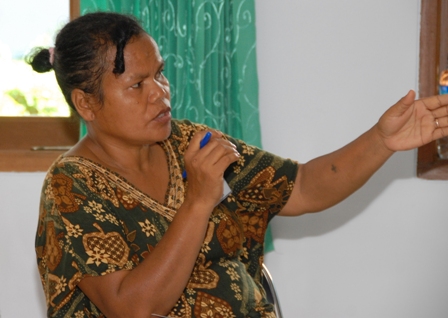Timorese women engage in democratic dialogue

Interpeace local partner, the Centre of Studies of Peace and Development (CEPAD), is currently undertaking nationwide community dialogues with women across Timor-Leste that focus on the importance of inclusive democracy and citizenship.
On 20 May 2012 Timor-Leste will celebrate ten years since the restoration of its independence following over 400 years of Portuguese colonization and Indonesian occupation. While much has been achieved over the past decade, women’s active participation in the definition of democracy and citizenship has often been limited, especially at the district level.
As CEPAD Executive Director João Boavida explains: “The situation and priorities of women in Timor-Leste are overlooked, issues of gender-based violence remain unaddressed, and inadequate attention is given to women’s active participation in the development process of their nation. If Timor-Leste is to transition into a lasting democracy it is crucial to actively involve women in this unfolding process.”
With the support of the Finnish Government, CEPAD is seeking to increase women’s participation in the consolidation of democracy through a series of “Interactive Dialogues,” designed to provide women with the opportunity to reflect upon, and speak out about, their role in the democratization process thus far.
Rather than a traditional classroom setting, these innovative training and facilitation materials are designed to allow participants to take their own local experiences and use them as a reference for exploring citizen rights and responsibilities within the Timorese context. Participants are encouraged to reflect upon their daily activities and share these with the group in a way that demonstrates a critical understanding of democratic principles and responsible citizenship vis-à-vis their own traditional practices at the household and community levels.
This approach has been enthusiastically received by women in Baucau, Maliana and Aileu districts as an eye-opening exercise in problematizing the role of traditional culture in the post-independence period.
Participants throughout the three districts agreed that while the division of labour between men and women has restricted women’s active participation in decision-making processes in some circumstances, local tradition and customs should not be viewed as “obstacles” to greater engagement in political processes. To this extent, dialogue sessions thus far have allowed participants to value their role within traditional culture as compatible with democratic principles based on civic rights and responsibilities.
CEPAD Programme Coordinator Joana Maria Viegas added that, “Sometimes people in the sub-districts think that democracy is just for foreigners or for Timorese living in the capital. However, we also know that democracy is about working together in our communities and respecting our traditional customs in everyday life.”
Nevertheless, while participants have expressed enthusiasm about CEPAD’s approach and implementation of the training material, it has become clear that much more needs to be done to strengthen women’s collective voice and access to decision-making processes beyond Dili and the respective district capitals.
Veronica Pereira, a participant from the Maliana district, shared her thoughts: “The dialogue today was very beneficial, however, what about women in the rural and remote areas? Dialogues such as this demonstrate that women aren’t afraid to participate; they just have never participated in this kind of training before.”
CEPAD is now in the process of implementing these interactive dialogues in Timor-Leste’s remaining nine districts in an effort to bring women from all areas of the country into an inclusive national dialogue on peace and democracy.
